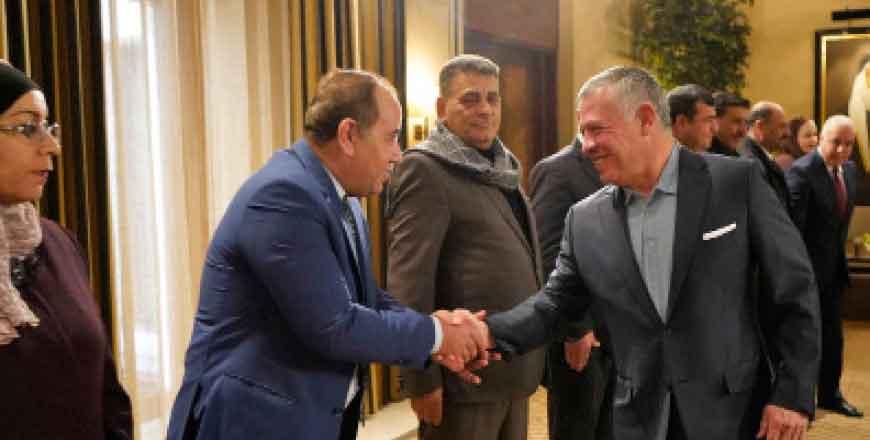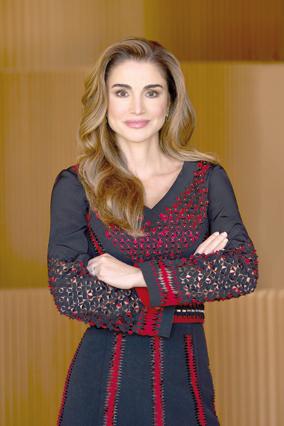You are here
Investing in Jordanians, King advances educational process to global standards
By Maram Kayed - Jun 08,2019 - Last updated at Jun 08,2019

Their Majesties King Abdullah and Queen Rania during the inauguration of the new premises of the Queen Rania Teacher Academy at the University of Jordan in January 2019 (Photo courtesy of Royal Court)
AMMAN — Jordan’s education sector has witnessed several developments over the past 20 years, receiving due attention from His Majesty King Abdullah, who believes that citizens are the key for the country’s development.
“It is from His Majesty’s unwavering faith in the Jordanian youth that his attentiveness to education stems from, thus its continuous growth and development,” said Mahmoud Balasmeh, a director at the Ministry of Education.
“It is not just the focus on improving students’ performance, but the focus on enhancing the educational process as a whole that defines His Majesty’s vision,” he added.
Jordan has an ever-growing literacy rate, considered one of the highest in the world, standing at about 97.9 per cent in 2012 and reaching 98.01 per cent in 2015.
The rate is expected to come close to 100 per cent by 2020, according to a recent UNESCO study.
In higher education, Jordan has 8,060 researchers per million people, while the world average is 2,532 per million, and the country continues to score higher than the EU’s average of 6,494 researchers per million, according to statistics released by the OIC Ankara Centre.
“These are rates that are impossible to acquire if you have a country whose leadership’s primary goal is not education. Luckily for Jordan, Their Majesties King Abdullah and Queen Rania have been long-standing advocates of, not only education, but quality education,” Mohammed Jbour, director of the Ministry of Education’s Zarqa Directorate, told The Jordan Times recently.
A 2015 UNDP study ranked Jordan as the number one country in the Arab world when it comes to education, which Jbour attributes to “an ability to keep up with ever-changing technological developments”.
“You cannot be called ‘literate’ nowadays without being computer literate. His Majesty King Abdullah knows that and therefore has extensively stressed integrating technology in all curriculums,” he added
Tharwat Mashagbeh, head of research and development at the Ministry of Education, said that “the achievements Jordan has steadily accumulated in its education sector over the past 20 years are indications that our people truly are our biggest investment”.
“The most important weapon in this digital age is knowledge. It is important that citizens are educated and given that weapon because they have very little else to fall back on,” she stressed.
In his designation letter in 2015 to then-prime minister Abdullah Ensour, His Majesty stated: “Our keenness is to invest in our citizens’ education and training to create a generation of forward-looking young people, who are equipped with the skills necessary to analyse, innovate and excel.”
Early reforms
“The early 2000s were a very important time for education,” Mohammed Saleh, a director in the ministry for more than 20 years, notes.
“The recent education reforms started in 1987 but were greatly accelerated in the early 2000’s under His Majesty King Abdullah, who had a vision of making Jordan a regional and global technological hub,” he added.
The Jordan Vision 2020 focused on making the Jordanian student “a conscious, versatile being”, as put by the director.
The vision, titled the Education Reform for the Knowledge Economy Programme (ErfKE), was the groundwork for what the World Bank called “the most ambitious programme in the entire MENA region”.
ErfKE was a 10-year multi-donor programme for which the World Bank alone provided $120 million.
“ErfKe was and still is an educational revolution. Only through it were we able to start upgrading our curriculum every three to four years, embracing all seven kinds of learners, focusing more on the infrastructure of schools and involving the community in educational outcomes,” Saleh indicated.
He stressed that the programme also promoted early childhood education, which has become an optional, but available, learning stage for parents to enroll their kids in.
“Today, you open a book and find questions invoking critical thinking, songs, visual media and all kinds of learning aids. That was unheard of before,” Saleh added.
“Not only that, but now every 10 schools are required to have a ‘development committee’ headed by a citizen and not a ministry employee. This gives parents a say as well,” he added.
According to USAID, the first phase of the programme was implemented from 2003 to 2009, while the second phase was applied from 2009 through 2015.
The aim of the second phase of the programme, as cited by USAID, was to “strengthen and institutionalise the reforms introduced under ERfKE I, with a particular focus on school level implementation and teacher quality”.
“Erfke may have concluded, but the Jordan Vision is still ongoing until 2020, as well as many other development programmes aimed at elevating Jordan’s educational performance,” Saleh concluded.
An eye on the future
In September 2016, at His Majesty’s request, the National Strategy for Human Resources Development (2016-2025) was launched.
A committee was formed in April of last year after His Majesty King Abdullah highlighted the urgent need for Jordan to develop an “integrated, comprehensive, strategic and well-defined system for human resources development”.
His Majesty tasked the government at the time with “formulating a national strategy, from which emerges a 10-year executive plan that encompasses primary and higher education as well as vocational and technical training and ushers in a qualitative leap for national human resources development”.
When launched, the national strategy stated in its agenda that by 2025, it hopes to have achieved several objectives through its reforms, including the “assurance that all children have access to quality early childhood learning, all children complete equitable and quality primary and secondary education, leading to relevant and effective learning outcomes”.
It also stated that it aims to “substantially increase the number of youth and adults who have relevant technical and vocational skills for employment, decent jobs and entrepreneurship”, as well as “ensure fair access to affordable, relevant and quality university education opportunities”.
The national committee proposes to achieve this vision over three phases, with the first focused on short-term changes, such as implementing pending and agreed projects, fast-tracking what it dubbed as “quick wins” and pilot projects and putting in place prerequisites to further changes.
Phase two is concerned with implementing new initiatives aimed at development and launching of new services, including careers, in-service training and apprenticeships.
The final phase, titled “Roll Out System-Wide Reforms”, would achieve a full implementation of “major-change” programmes, such as the reform of Tawjihi (General Secondary Education Certificate Examination) and the introduction of new degree-level technical provisions and programmes, according to the committee.
“I would say that despite the unexpected events the Kingdom has had to tackle in the last decade, such as regional unrest and a strained economy, the plan is going very well, thanks to His Majesty’s constant care,” noted Mashagbeh.
Related Articles
AMMAN — His Majesty King Abdullah on Wednesday reiterated that serving Jordanians and improving their living conditions is the top priority.
AMMAN — Mohammed Khdour and Saleh Hamdan on Wednesday received the keys to their new houses built under the directives of His Majesty King A
AMMAN — Her Majesty Queen Rania celebrates her birthday today, marking another year spent in the service of Jordan’s people in line with His


















